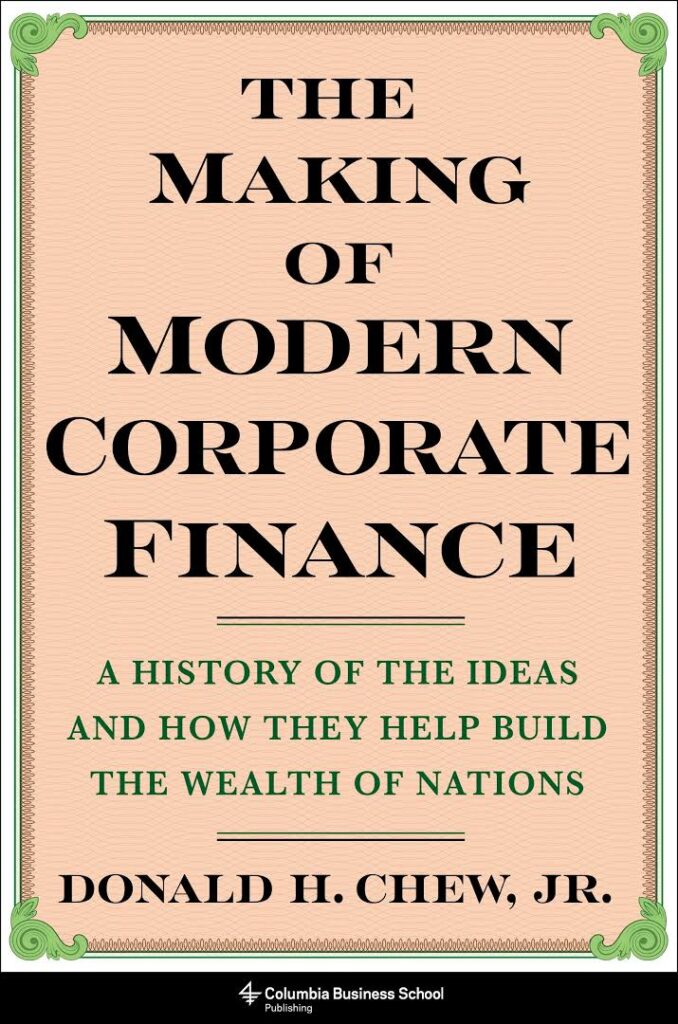The Making of Modern Corporate Finance. 2025. Donald H. Chew, Jr. Columbia University Press, Obtainable February 2025.
Donald Chew’s forthcoming e-book, The Making of Fashionable Company Finance, is a love letter to those that revealed within the Journal of Applied Corporate Finance, of which the writer is the founder and stays its publishing editor. It’s a love letter to unfettered capitalism and the monetary system that oils the gears of commerce. The e-book might be of curiosity to a broad readership however needs to be required studying for CFA charterholders, like me, who pursued their designation many years in the past and who could have — whereas maintaining with the day-to-day developments in finance — missed the broader perspective on the monetary improvements that underpin at the moment’s world system.
The subtitle, “A Historical past of the Concepts and How They Assist Construct the Wealth of Nations,” aptly describes the e-book’s narrative arc as it really works chronologically via 4 “core topics”:
- The company funding choice
- The company financing choice
- Enterprise danger administration
- Company governance and investor communication
After a chapter case research on Japan that successfully hyperlinks company finance and social wealth, the historical past begins with Franco Modigliani and Merton Miller’s late Fifties and early Sixties work on “capital construction and dividend irrelevance.” Slightly than capital construction, buyers ought to concentrate on earnings energy — funding in initiatives that earn at the least their price of capital — and the way company dangers are managed. If capital construction is a crimson herring, so too is the concentrate on near-term earnings per share (EPS). Chew presents, as instance: buyers who centered on quarterly EPS figures relatively than future earnings energy at Amazon.
The writer follows his sturdy opening with a dialogue of Michael Jensen and William Meckling’s well-cited paper on the company prices {of professional} administration to the pursuits of useful house owners, i.e., shareholders. Out there for company management, administration is incented to develop relatively than concentrate on earnings energy. This led to company takeovers in disparate sectors and to the bloated conglomerates of the Seventies, which in flip fostered the reimposition of management via leveraged buyouts (LBOs) and, finally, personal fairness.
The hefty curiosity funds imposed by the debt financing of LBOs redirected administration’s consideration from acquisitions to operational effectivity. The personal fairness (PE) company construction eradicated Jensen and Meckling’s company situation by controlling board seats or wholesale removing of goal corporations from public markets.
With every theoretical improvement — Modigliani and Miller, Jensen and Meckling and Stewart Meyers, who helped incorporate the Weighted Common Value of Capital (WACC)) into discounted money circulate methodologies and subsequently into company choices to proceed or abandon a undertaking, and Clifford Smith and Rene Stulz, whose work confirmed the significance of company danger administration as a vital part of maximizing shareholder returns – there have been practitioners keen to make use of the brand new instruments. Practitioners included firm administration, who adopted Bennet Stewart’s idea of “financial worth added” (EVA), which resulted in a shift of accountability from a centralized EPS focus to the assorted working models and a concentrate on earnings energy.
Fashionable company finance additionally included a reimagination of company incentive construction for executives. Chew contends that if executives at PE-owned corporations are paid like house owners (recall that this helps remove the company situation), executives at public corporations needs to be paid similarly. If pay construction and quantity are insufficient, public corporations will grow to be mere coaching grounds for the perfect leaders as they search superior pay underneath personal fairness. Chew discusses at some size the optimum construction of long-term incentives.
Lastly, the transformation of company finance included the event of recent markets to assist monetary improvements. Longtime readers of CFA Institute Financial Analysts Journal and different publications might be delighted to see a full chapter highlighting the pivotal position of e-book evaluation editor Marty Fridson in serving to develop the excessive yield debt markets that accommodated the surge of debt related to LBOs.
The previous paragraphs give a way of the e-book’s construction and content material. Nonetheless, the overarching narrative is of the USA’s financial energy– not its amassed capital or army power, however its monetary innovation and dynamism. The opening chapter on Japan is bookended by a concluding chapter on China and the variations between its monetary system and that of the USA. To this point, Chew contends, the Chinese language monetary system has fallen in need of its promise because it has traded off innovation and dynamism for state management — a façade of Western capital markets however with out the substance.
Examples from historical past and geography are thought-provoking. For instance, a parallel might be drawn between Seventies conglomerates and at the moment’s expansive expertise corporations, which exhibit each synergies, e.g., Alphabet and promoting, and silos, corresponding to Amazon’s AWS and on-line gross sales portal, throughout a number of enterprise traces.
Have the managers of those enterprises solved the company situation recognized by Jensen and Meckling and developed higher governance and extra disciplined administration? Many have dual-class share constructions, which tilt management nearer to the PE mannequin, however as Chew notes, the impact could also be time-limited. Shareholders could settle for founder management in periods of superior development however advocate an eventual change to a one-share, one-vote regime.
May the expertise giants’ expansive attain mirror different elements corresponding to market focus and monopoly or oligopoly returns? That is clearly a distinct topic than Chew units out to handle (see Tim Wu’s e-book, The Curse of Bigness). A second set of questions arises when Chew hyperlinks the lofty US inventory market valuations to the nation’s monetary dynamism. Whereas he makes a compelling case, market historians will observe that the premiums of US and worldwide fairness markets have seesawed backwards and forwards over time.

All through the e-book, Chew emphasizes the prevalence of the US mannequin and the ability of company finance to generate wealth and alleviate environmental and social issues. To this finish, he features a considerate dialogue on ESG points and their relevance to corporations and boards. Nonetheless, at occasions, his feedback are too broad and categorical about corporations’ position in addressing points and too dismissive of presidency’s position in offering the foundations and infrastructure upon which corporations rely. Lots of the points arose from company actions within the first place and may not have been addressed with out stakeholder or authorities motion to power the problems.
That could be a small grievance, to make certain, given the e-book’s consideration to element, considerate and fascinating construction, and full of life anecdotes. What in much less succesful fingers could be a dry textbook is, with Chew’s skilled contact, a beautiful historic overview of company finance and the USA’s continued pre-eminence. If in case you have preferred earlier works on danger and capital markets by Peter Bernstein, you’ll most actually take pleasure in The Making of Company Finance.


